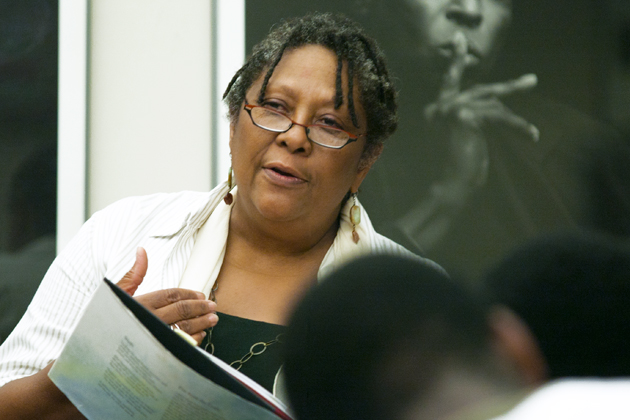
Professor emerita Marilyn Nelson once again finds herself in good company. Nelson, who taught English at UConn from 1978 to 2002, has been elected to the Board of Chancellors of the Academy of American Poets.
A former Connecticut Poet Laureate, Guggenheim Fellow, and Frost Medalist, she joins an illustrious list of current and former chancellors including Archibald MacLeish, Mark Van Doren, Amy Clampitt, W.H. Auden, Mark Doty, Jane Hirshfield, and Robert Lowell. In fact, the Board represents a veritable ‘Who’s Who’ in American poetry dating back over 60 years.
Marilyn Nelson’s poetry is remarkable for its sheer range of voice and style, for its historical roots, and for its lyrical narratives … She is a vital ambassador of poetry.
Fellow Board member Arthur Sze greeted news of Nelson’s election by saying, “Marilyn Nelson’s poetry is remarkable for its sheer range of voice and style, for its historical roots, and for its lyrical narratives that, replete with luminous details, unfold with emotional force that, ultimately, becomes praise … She is a vital ambassador of poetry.”
The Board was formed in 1946 according to guidelines set forth by the Academy’s founder, Marie Bullock, who stated, “These men and women must be chosen from amongst literary persons of the highest standing. They must themselves be known for their good judgment and eminent integrity of opinion.”
As a Chancellor, Nelson will join 14 other distinguished poets in serving as an ambassador of poetry to the world at large. She will act as a consultant to the organization on matters of artistic direction and programming and will help elect recipients of some of the Academy’s honors and awards. These include the Wallace Stevens Award, the Academy Fellowship, the Lenore Marshall Poetry Prize, the James Laughlin Award, the Walt Whitman Award, the Raiziss/de Palchi Translation Award, and the Harold Morton Landon Translation Award.
In accordance with the Academy’s mission to support American poets at all stages of their careers and to foster the appreciation of contemporary poetry, it also administers poetry prizes for students at nearly 200 colleges and universities nationwide under the stewardship of its Board of Chancellors.
“No one is notified in advance who is being considered for membership on the Board,” Nelson says. “Needless to say I was thrilled when I received an email from the [Academy’s] director telling me of my selection. I really feel honored to be in the company of the other poets on the Board.”
Accomplished poet, prolific author
Nelson was Poet Laureate of Connecticut from 2001 to 2006, and her list of national honors includes a Guggenheim Fellowship, the 2012 Frost Medal from the Poetry Society of America, two Pushcart Prizes, two creative writing fellowships from the National Endowment for the Arts, and a Fulbright Teaching Fellowship.
A prolific author, her award-winning books include The Homeplace, winner of the 1992 Annisfield-Wolf Award, which recognizes books that have made important contributions to our understanding of racism, and a finalist for the 1991 National Book Award; The Fields Of Praise: New And Selected Poems, which won the 1998 Poets’ Prize and was a finalist for the 1997 National Book Award; and Carver: A Life In Poems, which won the 2001 Boston Globe/Hornbook Award and the Flora Stieglitz Straus Award. Nelson is also author of Fortune’s Bones, which was a Coretta Scott King Honor Book and won the Lion and the Unicorn Award for Excellence in North American Poetry; and Faster Than Light: New and Selected Poems, 1996-2011, published last year.
She has also written collections of verse for children including Snook Alone, a picture-book illustrated by Timothy Basil Ering; Sweethearts of Rhythm: The Story of the Greatest All-Girl Swing Band in the World; The Freedom Business: Including A Narrative of the Life and Adventures of Venture, a Native of Africa; and The Cat Walked through the Casserole and Other Poems for Children.
Nelson says if she has one wish, it is that people not be afraid of poetry as a genre. “I think poetry anxiety is akin to math anxiety,” she laments, “and that comes from classroom experiences where students are asked what poetry means and then are afraid to ‘guess wrong’.
“What I wish is that people would just read poetry and let the meaning come to them without feeling they have to defend their interpretations … the best way to grow as a reader of poetry is to join poetry groups and talk about what you’ve read and just enjoy the experience.”
As a member of the Board of Chancellors of the American Academy of Poets, Nelson will have ample opportunity to spread that word.



